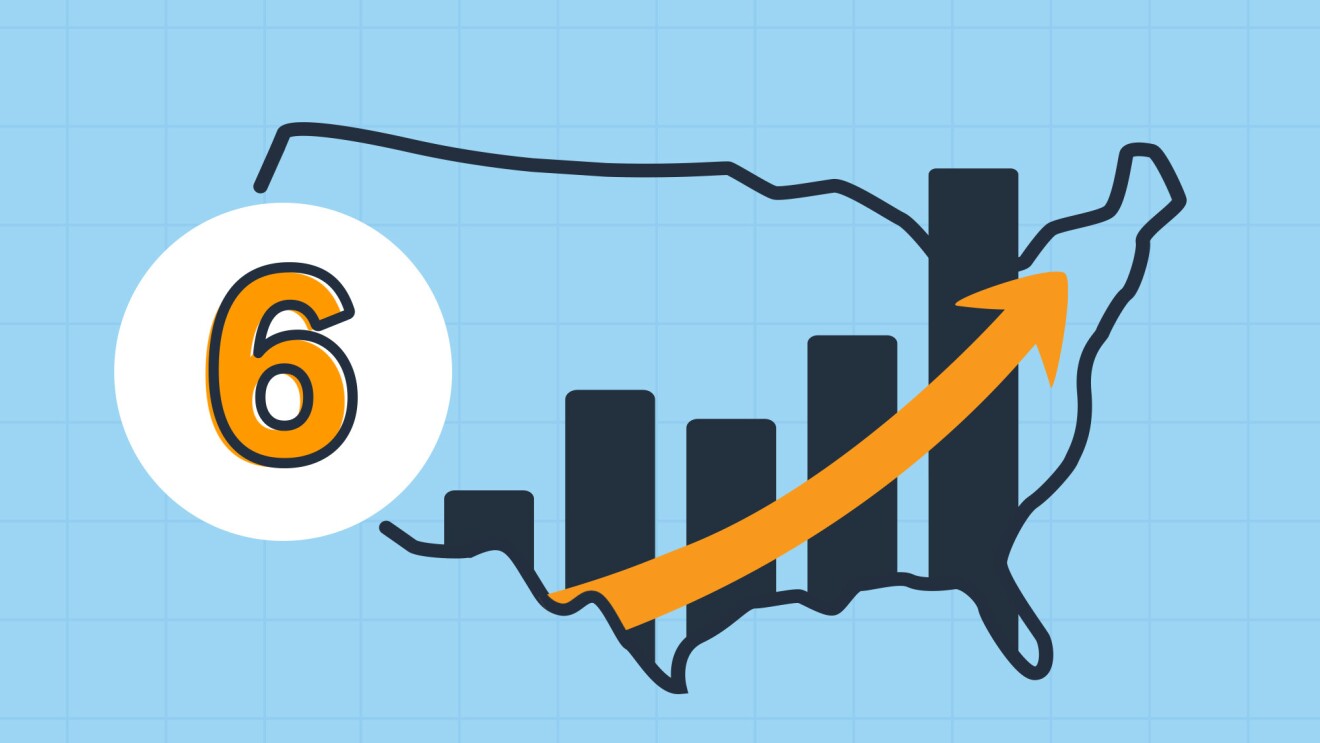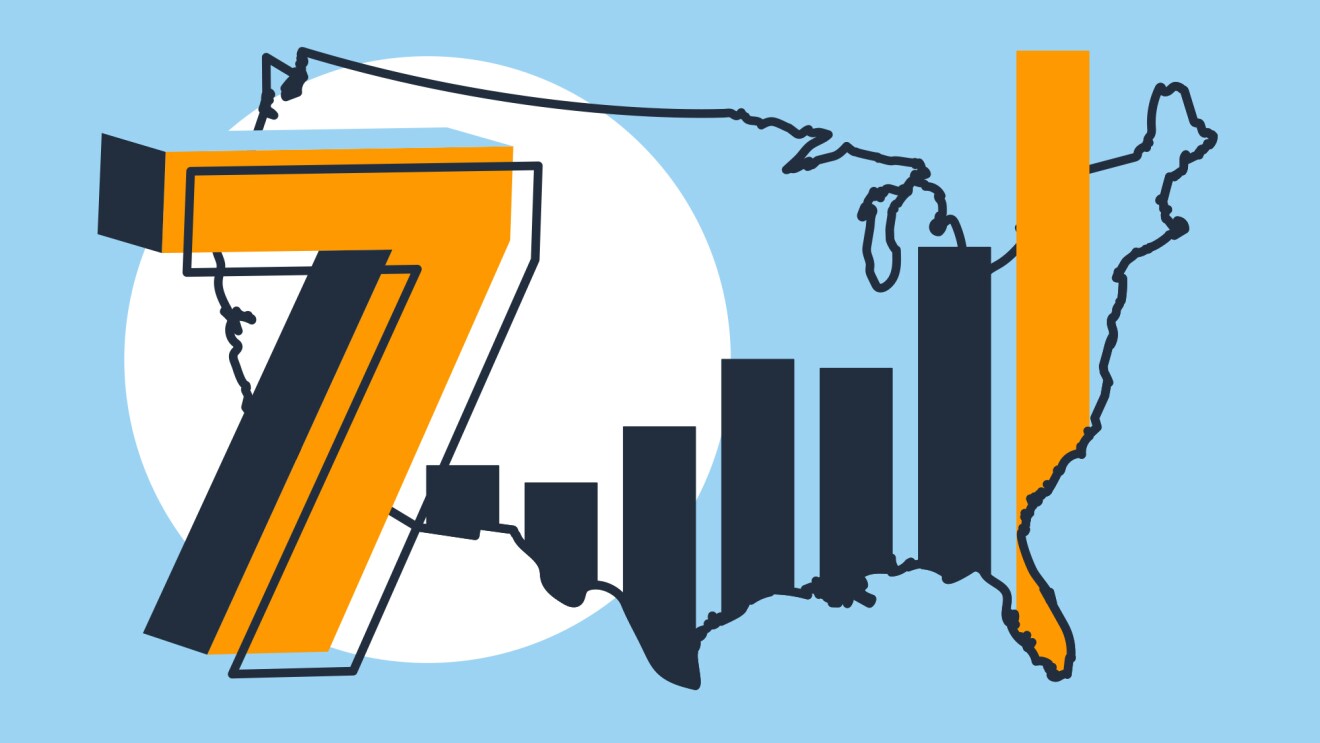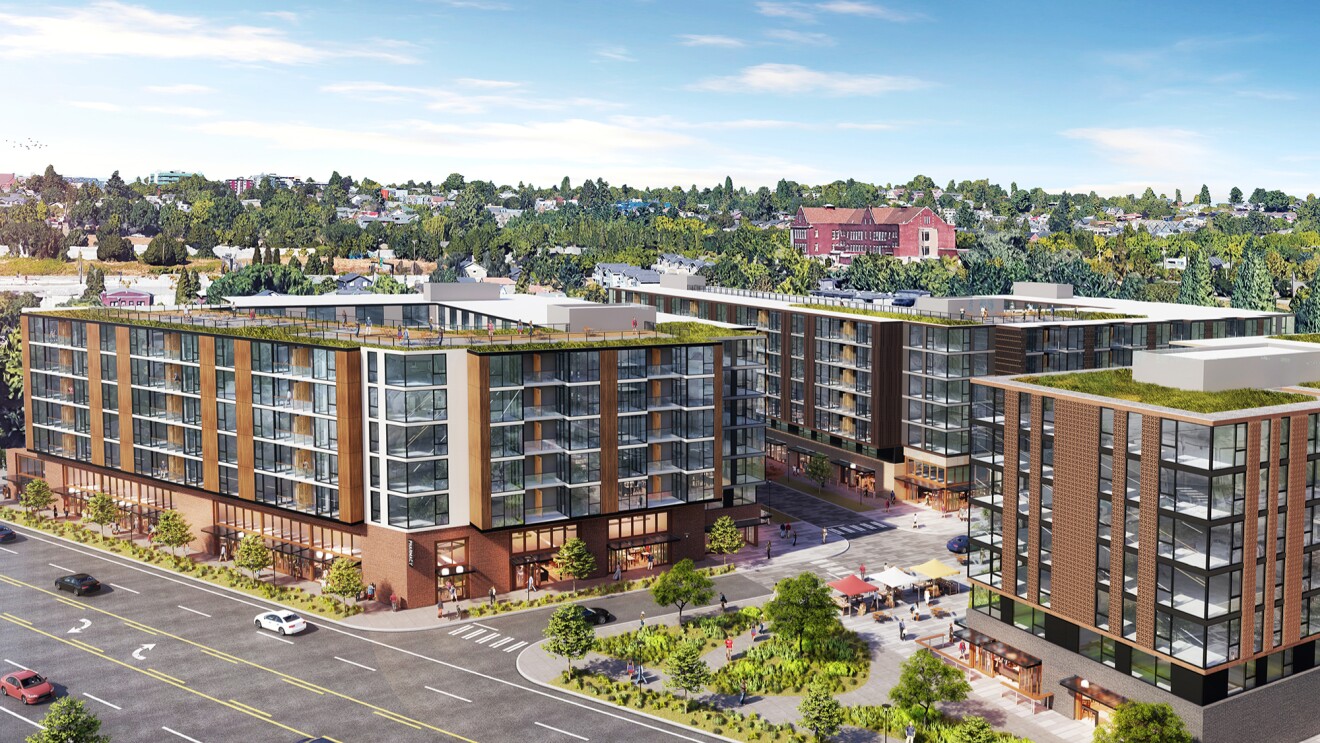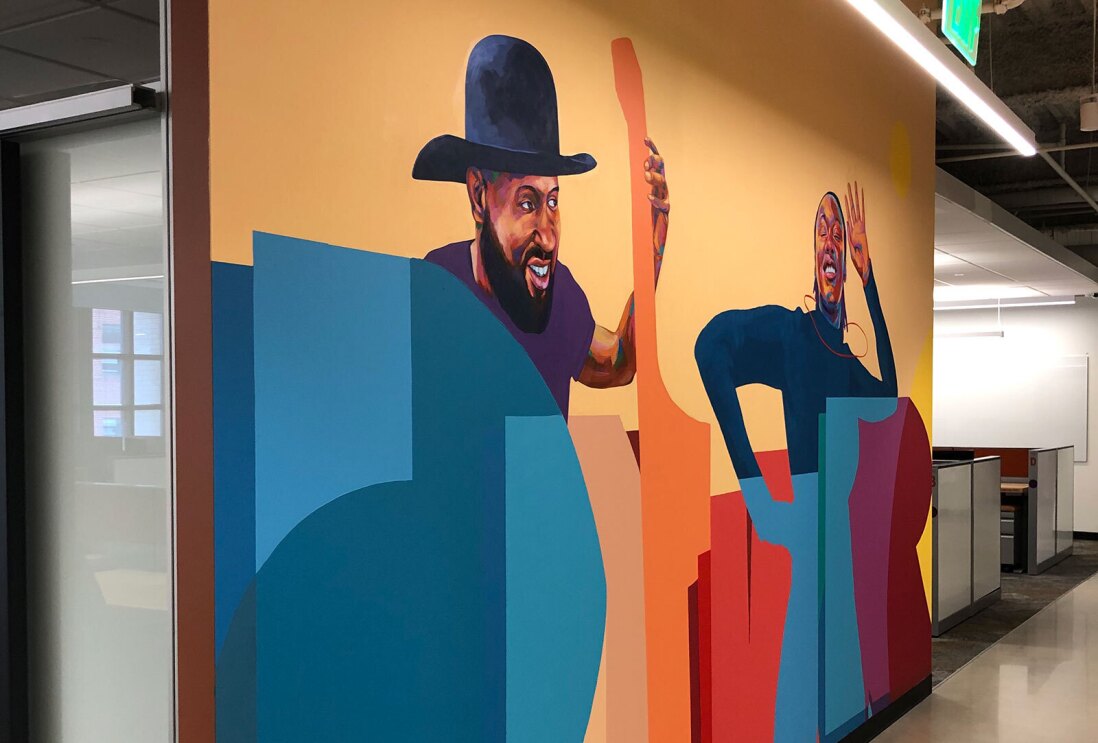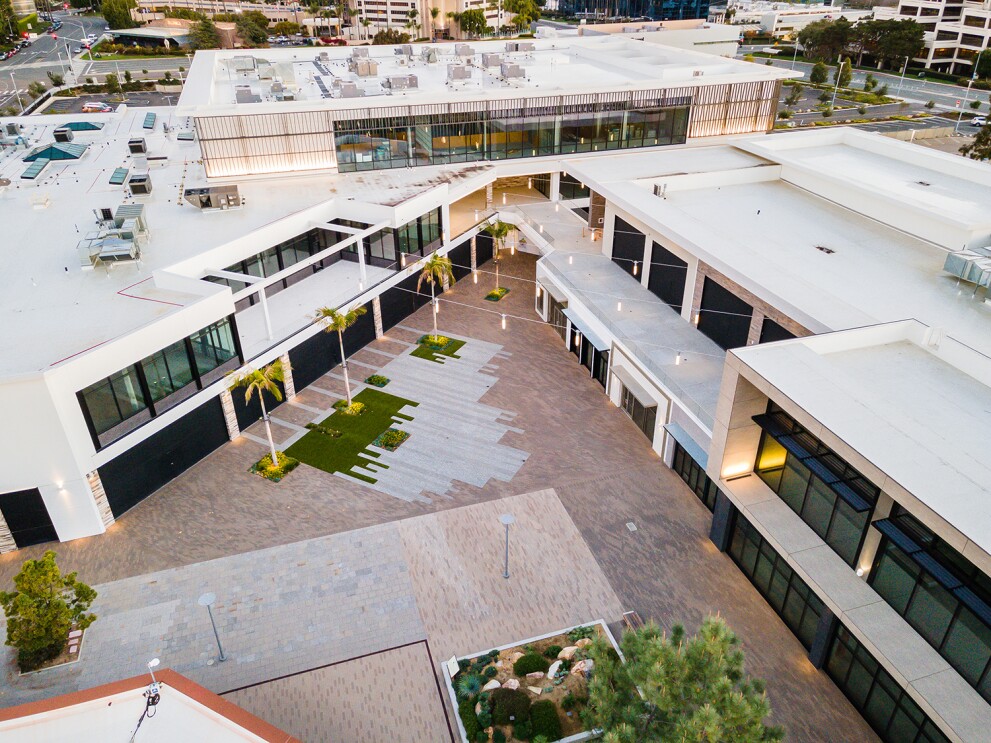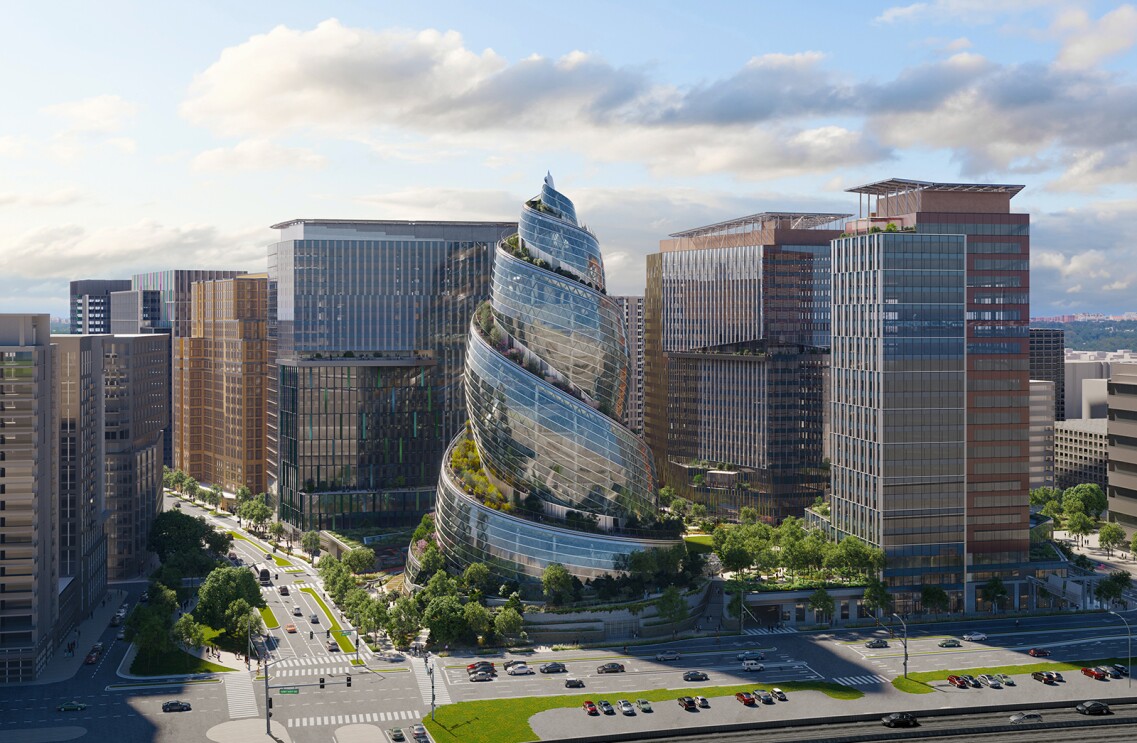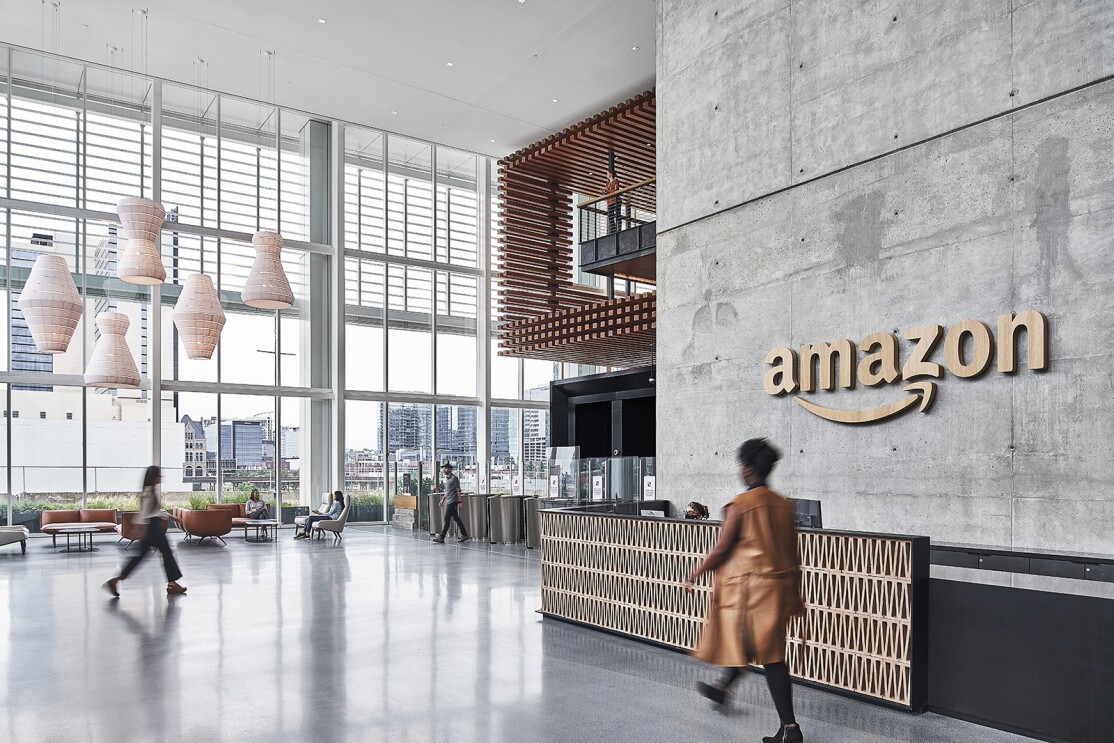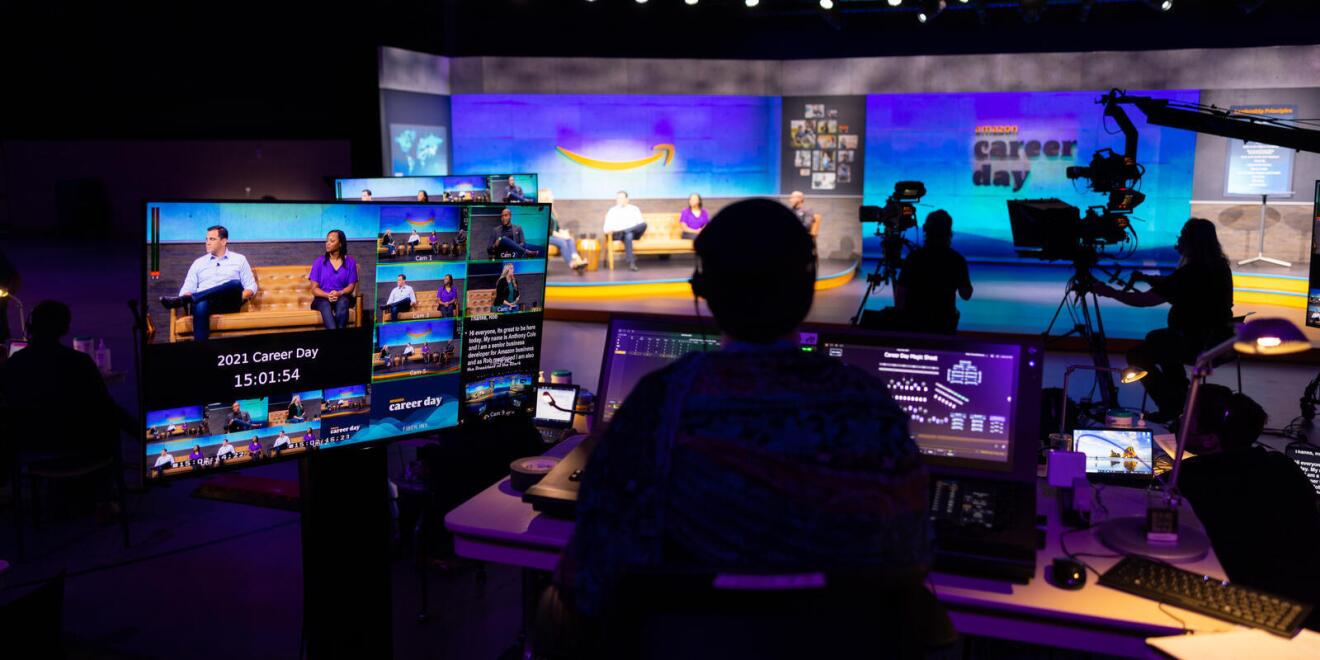I joined Amazon in 2001, and have lived in the Puget Sound my entire life. I’ve seen the cities across our region grow and expand into thriving hubs of technology and innovation, and as part of my role leading Amazon’s real estate team, I’ve had the opportunity to work with local leaders to not only build office space for our employees, but thriving communities and neighborhoods that are now 18-hour districts where people, live, work, shop, and relax. As we continue to grow and invest here, I want to give an update on what we’re doing as Amazon across the Eastside to make our growth here responsible, sustainable, and positive for the broader community, and say a big thanks to all the people and organizations working with us.
Expanding our Puget Sound headquarters
Amazon first opened an office in Bellevue in 2017, and we had about 450 people in the city at the time. As customer demand increased through the years, we continued to hire and grow in the Puget Sound region. And in 2020, we announced plans to invest much more on the Eastside—bringing 25,000 jobs, and making Bellevue and the Eastside the location of our future growth in the Puget Sound region.
Since then, several of our teams have already moved to our new offices in Bellevue and Redmond, and we expect to have 10,000 employees on the Eastside this summer. Later this year, we plan to open two new office buildings in Bellevue that will provide space for more than 2,000 employees. Once complete, all of our buildings in Bellevue will be less than a 15-minute walk from the new light rail station.
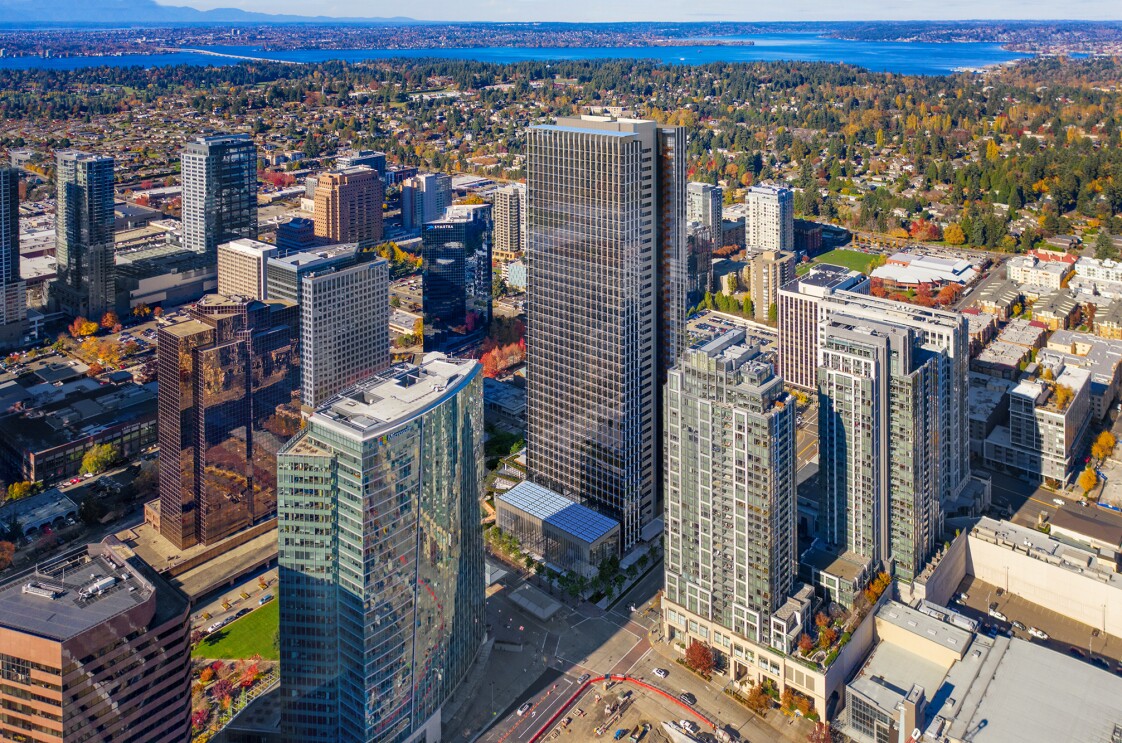
We’ve found the Eastside is a great place to call home, and we’ve really appreciated all the support we’ve received from the community. But as with any change, we recognize that our growth—and the growth around us as other companies also invest in the area—can create some challenges, including in critical areas like housing affordability and transportation. Those challenges also grow because of macro trends like inflation, a pandemic, and economic uncertainty, and the last few years have been particularly tough. So we’ve worked hard to be proactive and invest in building an inclusive community, focusing primarily on three key areas: creating and preserving affordable housing, promoting sustainable mobility options, and engaging with local communities on the issues that matter to you.
Supporting affordable housing
We know that job growth and affordable housing stock need to grow at the same pace in order to create a vibrant and equitable community. In Bellevue, a combination of a booming population and a limited housing supply have created affordable housing challenges dating back several years, disproportionally affecting low-income and minority families. Solving this problem will require a strong partnership between the public and private sector—and we want to do our part.
In January 2021, we launched the , a more than $2 billion commitment to preserve and create over 20,000 affordable homes in our hometown communities. The Fund focuses on increasing housing options for low- to moderate-income families. The commitment helps address a gap we saw in support for working residents—such as teachers, first responders, health care workers, and others—who are often spending 50% or more of their income on housing or enduring long commutes in exchange for lower rents.
In just over a year since the Fund’s creation, Amazon has invested $344 million in loans and grants in the Puget Sound region to create and preserve 2,870 affordable homes—including 1,157 in Bellevue. Our efforts increased the stock of affordable multifamily units in Bellevue by 20%, and since the Fund’s creation, surpassed by nearly 50% the number of affordable units achieved by the City of Bellevue since 2017, based on data provided by the city. Bellevue families moving into an Amazon-funded home could see a reduction in their rent-to-income ratio of up to 30%. We’ve also made a point to have all units located close to public transportation to alleviate the costs and burden of commuting to work. This means that they will have more resources to cover other basic needs beyond rent or commuting, like education and health care.
The homes we’ve funded through the King County Housing Authority, so far, are spread across seven communities:
- Hampton Greens. The community includes 326 one- and two-bedroom apartments located less than a half-mile away from public transportation.
- Pinewood Village. The 108 units offer spacious studio, one-bedroom, and two-bedroom apartments.
- Illahee Apartments. A garden-style community with 36 units conveniently located in the Bel-Red/Spring District corridor across the street from Bellevue Highlands Park and less than 1 mile from a future light rail station. This project preserves housing for extremely low-income households, those earning less than 30% of the area’s median income.
- Sandpiper East Apartments. Offering 224 units, this community is located approximately a half-mile from the Bel-Red/130th Street light rail station, which is scheduled to open in 2023.
- The Carrington Apartment Homes. The 108-unit community provides easy access to public transportation and five parks, and it’s walking distance to the central campus of Bellevue College.
- Surrey Downs Apartments. With 122 units located along a public bus line, these apartments are walking distance to restaurants and shopping.
- Spring District/120th Station. The 233 new-construction affordable apartments in Bellevue are aptly named after a nearby light rail station that is scheduled to open in 2023. The nonprofit developer BRIDGE Housing has teamed up with YMCA of Greater Seattle to provide youth and family services at the property.
For each Amazon-funded affordable home, rents will be maintained at levels affordable for low- and moderate-income families for 99 years, and rents will only increase with wage growth as determined by the U.S. Department of Housing and Urban Development. Real estate prices continue to go up, and this Amazon commitment will save families thousands of dollars annually. This is also just the start—we recognize that this is a regional challenge and you’ll see us investing further in new affordable housing in Bellevue and across the Puget Sound region, with several new projects already in the pipeline.
Despite our efforts in this area, we know that one company or the private sector alone can’t address and solve the affordable housing challenges in Bellevue and many other communities, and we believe there’s more that the private sector and governments can do to partner together. To help, we’re advocating for housing policies that will provide new tools for affordable housing preservation and production, here in Bellevue and across the country. For example, Amazon funded a $250,000 grant to the Bellevue School district to help teachers afford housing.
Amazon is also proud to be a co-founder of the broad-based coalition called the Eastside Housing Roundtable (EHR) that advocates for progressive housing policies on the Eastside. Since the coalition came together in 2021, we successfully advocated the King County Growth Management Planning Council to adopt increased job and housing growth targets for Bellevue. We also supported new policies at the county and local levels that have since been adopted, including an amendment to the Multifamily Tax Exemption (MFTE) program and a rezone of the East Main neighborhood to allow for taller buildings and more density.
As part of our multi-pronged effort, we’ll continue our advocacy at the federal, state, and local levels to support policies that create and preserve affordable housing in Bellevue—including land use changes to complete the Wilburton Vision, Bellevue’s plan for major infrastructure improvements in the Wilburton area, and the BelRed Look Back, which will transform a former industrial area to green space, businesses, and homes.
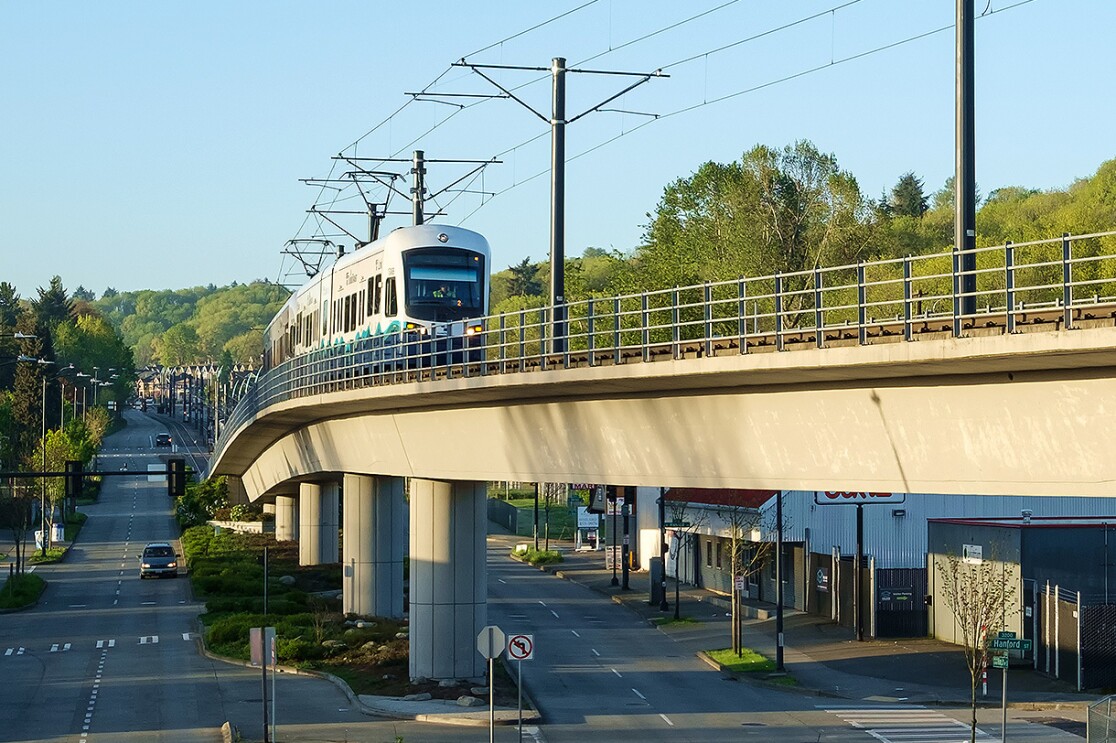
Investing in sustainable transportation and minimizing the impact of our employees’ commutes
The arrival of 25,000 employees would have an impact on any community, and we’re working with civic leaders and City Hall to ensure that, together, we’re making the necessary investments that will allow for sustainable growth. Mobility is a central aspect of this long-term planning approach, and we are currently focused on three big initiatives:
- Transit-oriented office locations. We intentionally selected office buildings close to Sound Transit’s new Downtown Bellevue light rail station, which is expected to be the primary commute method for Amazon employees when it opens in 2023. As we’ve done for many years, we continue to give free ORCA cards to all employees, allowing them to ride for free on King County Metro, Sound Transit, and King County Water Taxi routes—for both work and personal use. And to help employees commute from other areas across the region, the Amazon Ride shuttle program transports employees from various cities—including Edmonds, Bothell, and Sammamish—encouraging employees to leave their cars at home.
- Green infrastructure and benefits. We are investing in new infrastructure and employee benefits to encourage employees to walk or bike to work. We’ve committed $7.5 million to close the funding gap for two portions in Bellevue of the Eastrail, the 42-mile trail that will run from Snohomish County to Renton. Scheduled to open in 2024, the new trail sections will provide cyclists and pedestrians a continuous, connected commute. We’ve also launched a new benefit that allows Amazon employees in the Puget Sound to expense up to $170 per month on bike-related expenses, including bike tune-ups, bike parking, and even the ability to lease e-bikes.
- Legislative advocacy. We’re encouraging state and federal policymakers to pass legislation that helps prepare Bellevue and the Eastside to accommodate future growth. We’ve been active in Olympia to support state transportation funding, and we’re proud that the 2022 Washington State Legislature approved some historic investments. The Move Ahead WA package included key projects like the I-405 corridor, bus rapid transit on I-405, and the Mountains to Sound Greenway. These infrastructure projects will help Bellevue and other Eastside cities continue to welcome tens of thousands of jobs into the future while reducing congestion and carbon emissions.

Engaging with the Eastside community and supporting local nonprofits
For many years, we’ve been supporting the incredibly meaningful work of dozens of organizations across the region. Recently, the Puget Sound Business Journal named Amazon the number one corporate giver in the Puget Sound region. As we continue to grow on the Eastside, we’ve come to know many of the community leaders and really inspiring nonprofit organizations doing work there. We’ve been listening to both community leaders and elected officials to understand how we can better support their needs, and here are a few of the projects and organizations that we’re supporting:
- Bellevue’s Human Services Fund. When the COVID-19 pandemic struck, we knew human service providers would be on the front lines helping families in need. We wanted to quickly help these great nonprofits and ensure they avoided cumbersome applications or lengthy grant-writing processes. So we partnered directly with the City of Bellevue to support their Human Services Fund, to help service providers across the Eastside through a thoughtful, compassionate process. To date, we’ve donated $2 million to support the city’s Human Services Fund.
- Eastside nonprofits. We’re proud of the many community partnerships we’ve formed across the region and we’ve been inspired by the work done by local organizations. So far, we’ve funded projects across more than 100 East King County nonprofits and community initiatives, including our recent donation to the Bellevue Fire Foundation to help purchase a fire vehicle specifically designed to fight brush fires and urban forest fires. We also support the KidsQuest Children’s Museum, which serves the important function of getting children hands-on education focused on science, technology, engineering, and math (STEM), and SplashForward, a nonprofit focused on bringing a new aquatics facility to Bellevue. We also work hand-in-hand with community partners like the Boys & Girls Clubs of Bellevue to increase youth access to sports and recruit Amazon employees to be mentors through Rainier Athletes.
- Amazon Future Engineer program. This is a program we started in 2018 to provide greater access to computer science education. In Bellevue, this school year alone, we’ve supported more than 20 schools with access to computer science education and experiences like robotics clubs, educator professional learning, career talks, and behind-the-scenes fulfillment center tours. We also fund college scholarships and Amazon internships to promising students who have financial need.
- Bellevue College. We’ve donated $100,000 in funding scholarships and emergency aid, and created a partnership to offer students more opportunities to earn Amazon Web Services (AWS) Certifications and pathways to pursue internships and employment with AWS customers and partners. Additionally, Bellevue College’s computer science program—which offers a bachelor’s degree in computer science—inspired us to successfully champion a new state law in 2021 that allows all community colleges across Washington state to offer four-year computer science degrees. It brings high-demand degrees to students who need them and increases access and equity, especially for low-income students and students of color.
- Supporting the immediate needs of school children through Amazon’s Right Now Needs Fund. Since 2021, Amazon’s Right Now Needs Fund has donated nearly $2 million to provide food, shelter, clothing, school supplies, and other basic needs support in all 29 schools in the Bellevue School District in partnership with Bellevue LifeSpring. The supplies help schoolchildren and their families eliminate barriers to learning. The Right Now Needs Fund has so far supported more than 17,000 requests from Puget Sound students and their families.
- Amazon Neighborhood Small Business Relief Fund. At the outset of the pandemic, we knew we needed to help our neighbors—including the small businesses located both inside and outside our office buildings. Cities like Bellevue are an ecosystem in which large employers and small businesses rely on each other to succeed and thrive, and suddenly a lot of important foot traffic dried up. That’s why we created a fund to provide cash grants and rent relief to small businesses close to our offices. To date, we’ve provided more than $18 million in cash grants and rent relief through this program.
We’re proud to support all of these businesses, nonprofits, and community leaders, and we’re grateful for all they do to make Bellevue a vibrant place to live and work. We’re thrilled to be here, and on behalf of the entire company, I want to express my gratitude to the entire Bellevue community for welcoming us. This is, after all, where Amazon has its roots—in a garage on Northeast 28th street.
Bellevue has come a long way since Jeff Bezos started the company in that garage in 1994, building desks out of doors and driving packages to the local post office himself. The city and the entire Eastside has developed into a welcoming, business-friendly location with great amenities, a high quality of life, and a fantastic talent pool—and we will continue working hard to do our part to unlock even more opportunity for our neighbors and this city, as well as help ensure its sustainable growth, in years to come.
John
Trending news and stories
- Amazon CEO Andy Jassy shares the simple question that helps power Amazon's innovation
- Amazon will share its Q1 2025 earnings on May 1
- The Amazon Book Sale is back April 23-28 with thousands of deals across books, select devices, and memberships
- Amazon CEO Andy Jassy shares how AI will reinvent ‘virtually every customer experience we know’






